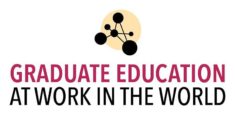About this Call for Proposals
Proposal Deadline: October 22, 2019
Conference Date: April 30 (public keynote) – May 1, 2020
Location: The Graduate Center, CUNY, NYC
Submit proposals at: bit.ly/grad-ed-at-work-cfp
The Futures Initiative and PublicsLab of the Graduate Center, CUNY in collaboartion with the Center for the Humanities and the James Gallery invite submissions for a free day-long conference and workshop: Graduate Education at Work in the World. The conference will bring together practitioners, students, faculty, and administrators to collectively imagine and redesign graduate education to support students, scholarship, and the public good.
This conference will focus on new approaches to graduate education in support of the public good, without losing sight of other key elements of higher education reform—including labor practices, student debt, efforts toward improving diversity and inclusion, shared governance, pedagogical training, and more. Participants will generate ideas, share best practices, consider difficult questions, and work toward new models for graduate education that support an array of creative, flexible career paths.
Our premise is that graduate education can lead to engaging and often unexpected opportunities—but this should not be left entirely to chance and the initiative of individual students. Moreover, deep connections between scholars and society can be mutually beneficial, as scholars have much to learn from communities of practice and other knowledge sources while contributing their own expertise. However, for these relationships to grow and thrive, graduate education must shift from a reproductive model to a generative one. We ask: How can our institutions reshape graduate education to support different futures? How, in so doing, may we also serve multiple publics and communities and engage in the most pressing problems of our time?
We will be asking how, in any field, one learns to translate specialized skills and knowledge for different audiences—a skill vital to academe and beyond. How can scholarly research have an impact within the communities students care about? What forms of material and intellectual resources, institutional requirements, thoughtful mentorship, flexible curricular design, and co-curricular experiences help to shape future lives, at work and in communities? Together, we hope to envision and champion an academy that supports multiple futures and contributes to the development of meaningful relationships between scholars and society.
Keynotes (April 30, 6:30pm, The James Gallery at the Graduate Center)
We are delighted to welcome keynote speakers Melissa DeShields and Micah Gilmer of Frontline Solutions, a Black-owned consulting firm that serves the philanthropic and nonprofit sectors. The firm focuses on community-driven innovation, intersectional equity, and activating a network for change.

Melissa DeShields helps organizations build strong teams, develop strategy, and execute plans effectively. A member of Frontline’s senior leadership team since 2015, Melissa has built a culture of learning, reflection, and deep connection between team members. She has led high-impact projects for Grantmakers for Girls of Color, W.K. Kellogg Foundation, and the Robert Wood Johnson Foundation. In particular, Melissa engineered the growth of A Gathering of Leaders into a community of 500 of the leading thinkers and doers focused on improving the outcomes for boys and men of color. Prior to joining Frontline, Melissa launched her own practice, DeShields Hagan and Associates. She has previously held senior-level positions at the Urban Affairs Coalition and at The Philadelphia Foundation. She is a graduate of Rutgers University.

Micah Gilmer is a researcher and writer who helps Frontline understand how the social technologies of racism and patriarchy create inequitable American systems. He works with clients to design research processes, build strong organizational cultures, and evaluate impact. Micah led the development of Frontline’s seminal report “Why We Can’t Wait” and contributed to “Gender Norms: A Key to Improving Outcomes Among Young Latinas.” His work has positioned Frontline as a national thought leader on issues of race and gender. Prior to leading at Frontline, Micah completed a Ph.D. in cultural anthropology at Duke University. His research is featured in the forthcoming book The Big Black Man Rules: Race, Manhood, and the Education of Black Boys. He also examined the connections between Zulu hip-hop, politics, and opportunity in Soweto, South Africa. He graduated from the University of North Carolina at Chapel Hill in 2004.
Call for Proposals: Participant Sessions (May 1, 10am-6pm, The Graduate Center)
Possible Themes and Topics
We welcome proposals on topics related to the conference theme described above, especially:
- Public-oriented and digital teaching and research examples
- Scholarship and pedagogy grounded in creative activity and artistic production
- Project-based scholarship driven by social justice
- Intellectual and practical skill development, vocational exploration, and civic professionalism
- Equity and inclusion in conjunction with career diversity and public engagement
- Developing sustainable models of academic labor systems
Format of Sessions
We encourage creative, participatory formats. Ideal sessions will be interactive and will provide attendees next steps, takeaways, models, or other practical implementation ideas for participants to take back to their home institutions. All session slots will be 75 minutes long (with the exception of lightning talks, which are five minutes each). Think of this more like teaching, less like reading a paper.
We welcome submissions that include multiple presenters, particularly when the presenters represent different roles or institutions. We especially invite submissions that address issues of inclusion and exclusion. Session proposals should strive to include participants from a range of backgrounds, especially those historically underrepresented in the academy.
Submitting a Proposal
Please submit proposals at: bit.ly/grad-ed-at-work-cfp. The proposal form includes information for each of the presenters, a 200-word description of your proposed topic, and a 100-word description of your proposed format.
Proposals are due by October 22, 2019. We plan to send decisions by the end of the calendar year.


Co-sponsored by the Futures Initiative, PublicsLab, the James Gallery, and the Center for the Humanities at the Graduate Center, CUNY.
